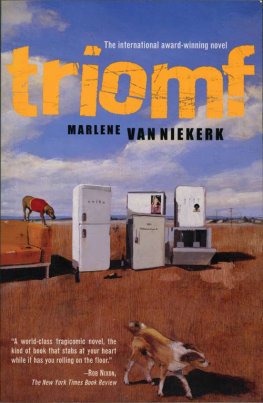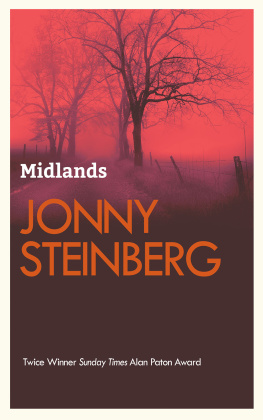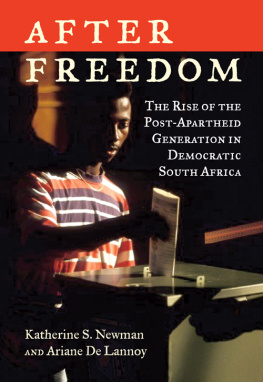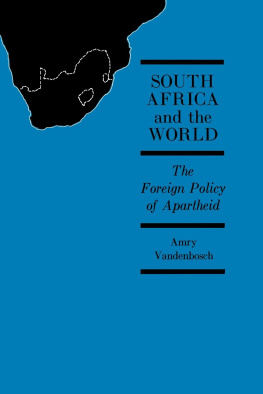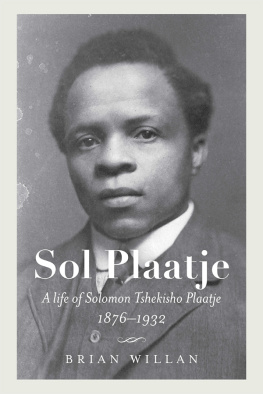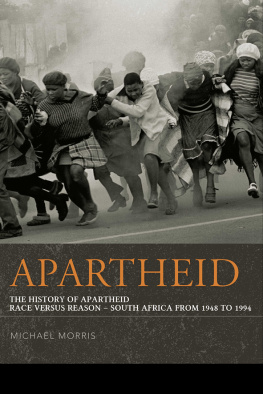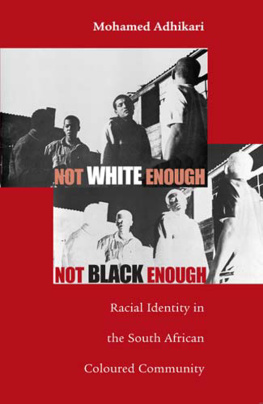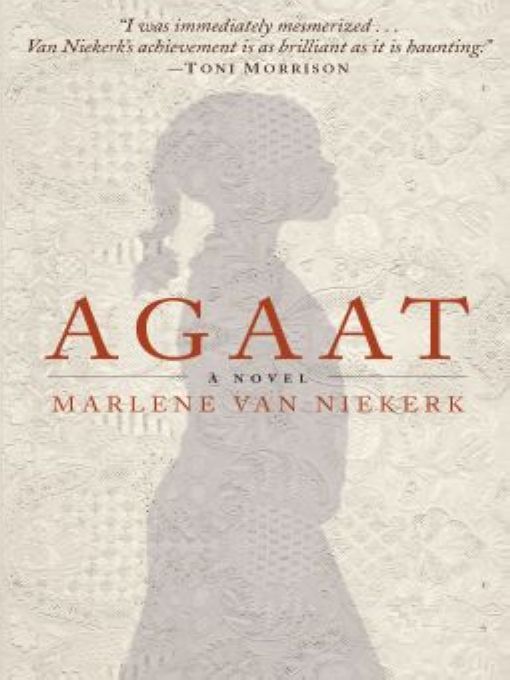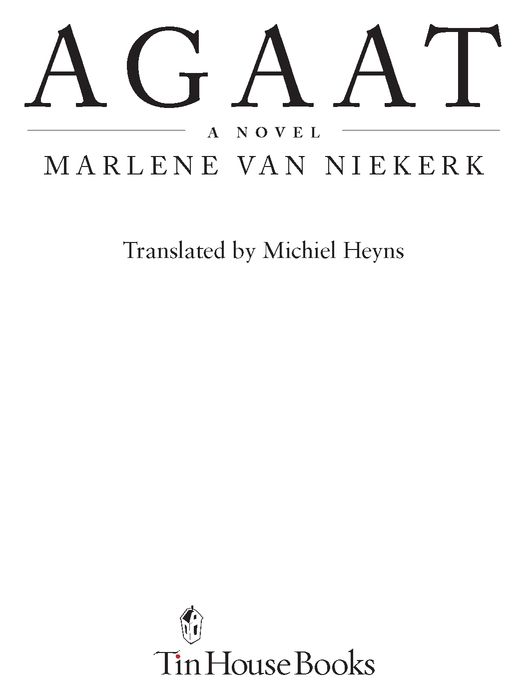Table of Contents
Also by Marlene van Niekerk
Triomf
For Lou-Mari
TRANSLATORS NOTE
Agaat is a highly allusive text, permeated, at times almost subliminally, with traces of Afrikaans cultural goods: songs, childrens rhymes, childrens games, hymns, idiomatic expressions, farming lore. I have as far as possible made my own translations of these, in an attempt to retain something of the sound, rhythm, register and cultural specificity of the original. Where, however, the author has quoted from mainstream Afrikaans poetry, I have tried to find equivalents from English poetry. I have also taken the liberty of extending the range of poetic allusion. Readers will thus find scraps of English poetry interspersed, generally without acknowledgement, in the text.
Certain Afrikaans words I have judged too culturally specific to be translated into English; indeed, almost all the Afrikaans words I have used in this translation occur either in the Oxford English Dictionary or the Oxford Dictionary of South African English, as having passed into South African English usage. For readers not having ready access to these sources, a glossary of Afrikaans words is appended.
I am grateful to Lynda Gilfillan for her meticulous editing of this translation, and to Riana Barnard for her efficient and cheerful administration.
M.H.
This new volume seeks to interpret the growth, passion and expansion of the soul of the nation. May the indefinable elementthe force and flavour of this Southlandbe found, felt and experienced, then the nation will press it to their hearts and adopt it as their own.
From the Introduction to the first edition of the FAK-Volksangbundel [National Anthology of Song of the Federation of Afrikaans Culture Organisations]. H. Gutsche, W.J. du P. Erlank, S.H. Eyssen (eds.). Firma J.H. De Bussy Pretoria, HAUM. V/H Jacques Dusseau & Co, Cape Town, 1937.
That is the beauty, the value of this book: that it was born out of love and inspires to love, that nobody can doubt. And with that a great service is done to the nation, for who feels for beauty, on whatever terrain, has a contribution to make to the cultural development of the nation.
The area this book makes its own, is a specifically feminine one and through that contributes to the refinement and beautification of the domestic atmosphere. Such an atmosphere distinguishes the culturally aware nation from the uncivilised.
From the Foreword by Mrs E. (Betsie) Verwoerd to Borduur So [Embroider Like This], Hetsie van Wyk, Afrikaanse Pers-boekhandel, Johannesburg, 1966.
This Handbook... serves as a key to the unlocking of the treasure chambers of climate, soil, livestock and marketing potential on each of the 93,000 farms of our country.
Just as the Bible points the way to spiritual perfection so will this Handbook also point to ways and means to more profitable farming and to greater prosperity for every farmer in every part of the country.
I should dearly love to see this Handbook finding its way into every farm dwelling and coming into the hands of every person who farms or who is interested in agricultural matters, because it is a rich mine of useful information.
From the Foreword by His Honour General J.G.C. Kemp, Minister of Agriculture, to the Hulpboek vir Boere in Suid-Afrika [Handbook for Farmers in South Africa]. Written by civil servants and other experts, Government Printing Works, Pretoria, 1929.
PROLOGUE
Matt-white winter. Stop-start traffic. Storm warning. And I. In two places at once, as always. Snow on my shoulder, but with the light of the Overberg haunting me, the wet black apparitions of winter, the mirages of summer. Tumbling lark above the rustling wheatfields. Twitter machine. A very heaven, the time of my childhood. How could I tell that to anybody in this city? Heaven is a curiosity here. Hereafter. Strange word in my head. My reaction to the telegram strange too. First numb, then anxious, tears later. An aperture in the skull. Now the memories are a stream, unquenchable.
For parting is no single act, it is like a trailing streamer.
That first descent here eleven years ago, stiff in all my joints. Didnt close an eye on the whole fourteen-hour flight. Fear, worry, feelings of guilt. What was I? Who was I? A ten-day beard, a vacation visa in a passport, a loose cannon without letters of accreditation. A farmer seeking asylum, as far as the Canadian bureaucracy was concerned. A deserting soldier with his training certificates, his pilots licences, his oath of secrecy. What more could I give them? A confession?
Left home without greeting or explanation. That morning, still dark, the smell of wet soot, Gaat giving me the little key to the sideboard so that I could take out my papers. Her face grey and sad, her cap askew. Four oclock in the morning, the only one who knew where I was headed and why. Will I ever be able to forgive myself? For saddling her with such a responsibility?
White drifts of snow banked on both sides of the road. Windscreen wipers at full speed. I cant wipe away the images. Banded watermelon under the Herrnhuter knife, Boer pumpkins nestled in hairy dark-green leaves, a brown-tipped fleece of merino wool breaking open, heavy with oil, on the sorting table. Blue lupins chest-high in flower, yellow cream of Jersey cows, the sound when you crack open a pomegranate, the white membranes gripping the clustered pips. Red and white, just like blood on freshly shorn sheep.
Lord, I sound like my mother. Melancholy over-sensitive Ma. Now dying. Will she recognise me? With the beard? Gaat will. Willy-nilly.
Have been having the same dream, over and over recently. Gaat calling me, us calling each other. Awake. Disturbance. An abyss where sleep should be. The calling with our hands cupped in front of our mouths, she in the yard down below in her white apron, visible to me where Im hiding in the kloofs above the house. Later long whistlings that you could pick up on the dryland at the back if you were below the wind. Later still the blowing on Hubbly Bubbly bottles.
Slowly to the surface, awake to wind-borne whistlings. Sleepless in Toronto. Night music. Till I drift off again, dreaming that we signal to each other on the rams horn, soft low notes. How careful we had to be when we were looking for the purple emperor in the woods. Grey-black, folded shut in the shadows till it opened its wings, blue on one side only, scintillating, vapoured with silver, blood shaking my heart.
Leaking heart.
On and on the blue flickering sliced by the sharp sweep of the wipers. Salt on the road, broth of snow-slush on the windscreen, on the rear window. Lapis lazuli, it flickers, the colour of the dream, a blue iridescing from moment to moment, between inhaling and exhaling, first on one wing, then on the other. Book of vespers. Apatura iris. The giant purple emperor butterfly.
Miracles. Catastrophes. Continent that tops up its water level with blood, and that fertilises with blood. Who wrote that?
Here the blood has long since been spilt. Cold. The massacres efficiently commemorated, functionally packaged, sanitised. Only I, more freshly cut by history, trying to find my own way in the cool archives. Cut grass lies frail. My smell attracts other vulnerabilities. Found the Sainte Marie files yesterday, Bleeding Heel, Broken Shoulder, Wounded Knee, for the new instrument studio in Toronto. A percussion theatre where the visitor will rattle seed pods, brush the tin cymbals with a handful of grass.


